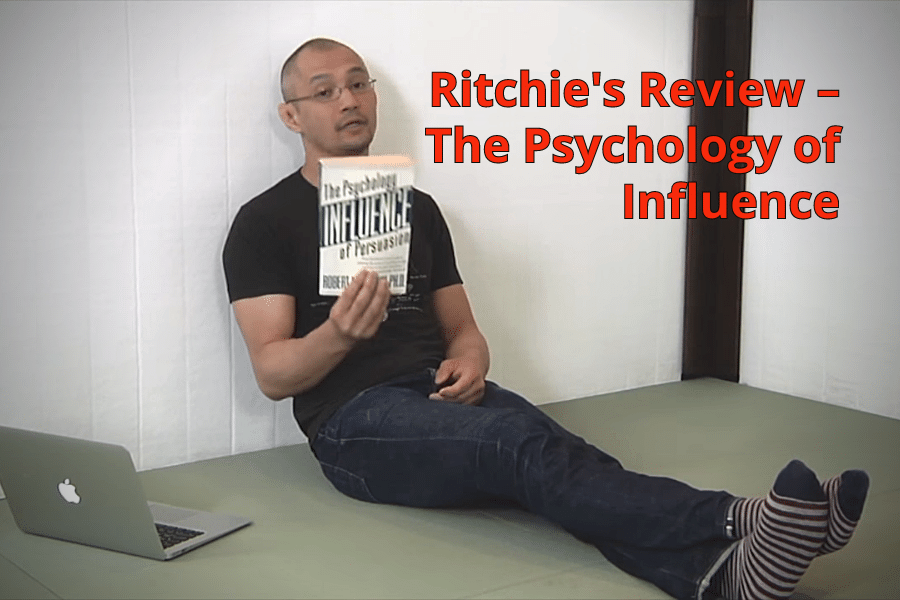
Hey everybody, Ritchie Yip here.
Today we are talking about Robert Cialdini’s ‘The Psychology of Influence’. It’s a really cool book. I think it’s critical reading for anybody that owns a business or anybody who is in sales.
I first read The Psychology of Influence’ in 98 or 99. I saw it in the local book store – it was right there, front and center in display and I picked it up. I had no idea it would be so influential in my life, but also it has become a staple. So many business leaders that I follow recommend reading this particular book. It’s actually become quite famous over the years.
The very first thing I want to talk about is how Cialdini breaks down the idea of influence and how people are persuaded into six key components. Now these are tools, and my interpretation of these tools are that – it’s like a knife. You can use a knife to cook an amazing gourmet dinner. You can also use a knife to saw somebodies head off. You can use a knife for evil things as well. You just want to be aware of that. Every single tool – you use a bandsaw, right? There’s a utility for it but there’s some safety features. There are some safety features. The Psychology of Influence’ does talk about these precautions.
You can use these tools to make your business function to it’s highest capacity but you can also use these tools for evil. Furthermore, you can also be weary when people are trying to use these tools on you. If you’ve read this book and you’re using them in your business, to me it is almost hilarious when people try to use these tools on me. I almost straight up call them out on it.
Reciprocation
The very first tool – reciprocation. That’s basically when you do something nice for a friend – let’s say I help you move. In a month, I need to move. I say something like “Hey, dude, can you help me move?” You almost feel obligated to say yes, and most people do. That’s what Cialdini talks about. There’s an impulse for us to help those who have helped us first.
Now, that’s basically the foundation of my business. For our martial arts school, we promote our martial arts school through our blog. There’s hundreds of articles, totally free, on our blog.
How to do a side kick. How to do an arm bar. How to do a guillotine choke. How to pass guard. Totally free. We have a youtube channel with videos explaining, demonstrating how to do very complex martial arts techniques, all for free.
Now you will watch these videos and you’ll get – hopefully, if you’re into martial arts, you’re interested in martial arts, you’re interested in trying martial arts, you’ll see the videos. You’ll be like, “wow, this is great value.” I’ve already given you something, right? And then, when you come into my school, I give everyone that walks into my school a free private. From myself or one of our instructors, they’ll give you a free, one on one, private.
Most people are totally freaked out when they do martial arts. Don’t even worry about it. Come in, we’ll guide you by the hand and show you a couple really simple techniques, right? Show you what martial arts is all about. And as well, we give everybody a free trial. You can come out you can check out our classes, you don’t have to give us any money. This is our way of demonstrating how great we are. And then, after we’ve given you all this really cool stuff, we’re giving you some great value, then we’re like, “so, what do you think?” And we’ll ask for some money, right? If you think that we don’t deserve your money, that’s totally cool. But a lot of people come in, they experience the value.
Through youtube or through our blog they experience the value we’re giving them. Through the free trial, through the free private that, so far it’s worked out pretty good. We have two schools, we have nine instructors right now, we have hundreds of students, so it’s worked out pretty well. So that is the Cialdini law of reciprocation.
Commitment And Consistency.
Now, basically, commitment and consistency is if you do something; then, you’ll probably do it again. If I run a red light, I’ll probably run a red light again. If I help a friend, I’ll probably help a friend again.
So how do we use that for my business?
Well, the way that we use it is vey subtle. Basically, when people go and they register for their free trial, for their free private, so they go to our website and they register, basically a page pops up on our website, and it says something like – and it’s very polite and very funny, but we basically say something like – unless you’re absolutely serious, don’t even bother coming in. Unless you are totally dedicated to changing your life, to making a positive change to your lifestyle, don’t waste my time, don’t waste your time. And there’s a big button – click here. And it says something like ‘yes, I am committed to making a positive change in my life’. Big button. Click. And then that completes your registration to commit to you free trial.
That’s what we do. And it just allows us to make sure that you are committed. It allows us to make sure that if you are coming in that you’re not there to cause trouble, you’re not there to hurt people. You really want to go and change your life for the better. So that’s how we use that Cialdini principle of commitment and consistency.
Social Proof
InThe Psychology of Influence, Cialdini talks about social proof. So what’s social proof? Social proof is like if I got George Clooney to say Ritchie Yip and his group of instructors at InFighting Training Centers are awesome. Then our school would blow up.There would be so many people. It would be huge, because we have George Clooney, a person with high status, saying that we are great.
Social proof is also having lots of students. You can’t fake that. You come in, you check out one of the group classes and there is twenty other people there. It’s like a busy restaurant. It’s like a night club with a huge lineup. This restaurant has got to be good if there is all these people here. This nightclub has got to be fantastic if there is all these people waiting to use it.
Basically, it’s the herd mentality.
Authority.
Also, I sell the school because I try to be an authority. I try to have a youtubechannel. I try to put stuff up on my blog. You look at the blog and there’s like two hundred articles. You look through them and they are largely written by me. Every single one of them, except for maybe two or three which are not written by me. You look through that like, wow this guy knows a lot. He’s got two hundred articles. And also, youtube videos. I’ve got like, I don’t know how many. Over four hundred, I think. It creates an authority figure.
The thing is, really, anybody can have a youtube channel. Anybody can have a blog. You just got to go and put stuff out there. But it’s weird when people see me on youtube, then they see me at the school. I’ve had people come up to me on the street and they’re like, “you’re Ritchie Yip. I’ve seen your youtube videos.” I’m like, hey, man. Hi. I shake their hand and stuff and then their like, wow this is so cool, you’re Ritchie Yip, and I’m like – it’s cool, it’s really, really nice – but you could have a youtube channel. You could have a youtube video, right? It’s weird how youtube is basically like having your own television station. People still see the idea of having a television station as being an elite thing, right?
Liking
Being likable is huge. If you like somebody, you’ll probably listen to their advice. You will probably buy something from somebody who you really, really like. Being likable is really important if you are in sales or if you own your own business.
Basically I try to be as amiable as possible. I try to be as warm and welcoming when people come into the school for the very first time, it’s what I encourage all of my instructors to do. To be really warm, to be really welcoming, it’s really the foundation of the school, in order to build a sense of community. Being likable is critical in order to possibly sell your service.
Scarcity
The last thing that Cialdini talks about inThe Psychology of Influence is scarcity.
Basically it’s the whole buy now there’s only two left kind of a thing. We don’t use that too much. Sometimes, what we will use in my business for scarcity is almost like a time constraint, in the sense that this offer is only available for a limited time.
So it’s your limited time offer. It’s a scarcity, but with time. That’s how we use it in our business. It’s funny, when I go and buy something, like a stereo or something like that, the salesperson will say something like there’s only two of these left, and I’m like, come on, man. There’s really not two left. And if I really wanted to, I could just order one from online or I could just have you order it for me. There’s really not two left, right? And I say that.
My point is, just by understanding the principles outlined in The Psychology of Influence, you’re able to understand how they are used in marketing and sales everywhere. You can use it in your business so that way your business is performing at it’s highest level and that way you also don’t fall prey to someone who is using some of these tactics in an unethical manner.
The Psychology of Influence, by Robert Cialdini. Great book, definitely check it out.


